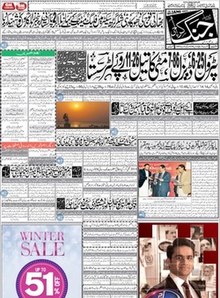Daily Jang
 Front page of Karachi edition on January 1, 2015 | |
| Type | Daily newspaper |
|---|---|
| Format | Broadsheet |
| Owner(s) | Jang Group of Newspapers |
| Founder(s) | Mir Khalil ur Rehman |
| Editor | Mir Shakil-ur-Rahman |
| Founded | 1939 |
| Political alignment | conservative[1] |
| Language | Urdu |
| Headquarters | Karachi, Pakistan |
| Sister newspapers | The News International Daily News Daily Awam |
| Website | http://www.jang.com.pk/jang/ |
The Daily Jang (Urdu: روزنامہ جنگ) is an Urdu newspaper headquartered in Karachi, Pakistan. It is the oldest newspaper of Pakistan in continuous publication since its foundation in 1939. Its current group chief executive and editor-in-chief is Mir Shakil-ur-Rahman. Past editors and contributors have included Mahmood Shaam, Nazir Naji and Shafi Aqeel.[2]
Its current[when?] list of columnists includes Saleem Safi, Hassan Nisar, Ghazi Salahuddin, Wajahat Masood, Hafeezullah Niazi, Irshad Bhatti, Mazhar Barlas, Ataul Haq Qasmi, Ansar Abbasi, Anwar Ghazi, Ali Moeen Nawazish and Yasir Pirzada.
Jang is published by the Jang Group of Newspapers. The group's flagship Daily Jang is Pakistan's most prominent Urdu daily newspaper.[citation needed] The group also owns Geo News, arguably the most popular news channel in Pakistan.
It is published from Karachi, Lahore, Rawalpindi, Quetta, Multan and London.
The Pakistani prime minister, Imran Khan, has said, "Pakistani news media is freer than its Western counterparts." According to him, Pakistani news media can publish anything without proper verification because there are no libel laws in the country. So, Pakistani media is freer than the Western media, he concluded. In contrast to Khan, The Guardian wrote in its issue of November 5, 2019, "Journalists, activists, authors, and politicians spoke to the Guardian of a climate of 'extreme fear and self-censorship', and the suppression of opposition political voices, even worse than during the military dictatorship of General Zia, who oppressively ruled Pakistan between 1977 and 1988."[3]
References[]
- ^ Durrani, Ammara (2009), "Pride and Proliferation: Pakistan's Nuclear Psyche After A. Q. Khan", South Asian Cultures of the Bomb: Atomic Publics and the State in India and Pakistan, Indiana University Press, p. 103
- ^ "Jang Group of Newspapers intimidated by Government", Committee to Protect Journalists website, December 15, 1998. Retrieved July 17, 2018.
- ^ "Extreme fear of self-censorship: media freedom under threat in Pakistan", The Guardian, London, November 5, 2019.
External links[]
- 1946 establishments in India
- Publications established in 1946
- Daily newspapers published in Pakistan
- Mass media in Karachi
- Urdu-language newspapers published in Pakistan
- Conservatism in Pakistan
- Newspapers published in Pakistan stubs